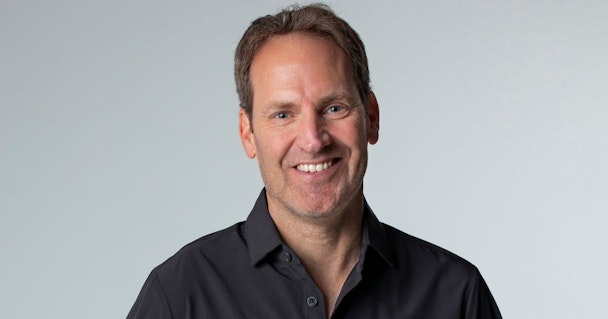‘The soul of this company will never suck’: VMLY&R’s Jon Cook on leading a network agency
Kansas City adman Jon Cook is global chief executive officer of WPP’s VMLY&R. We sat down with him to talk about scaling leadership from 100 employees to 13,000 and what keeps the leader of a network agency up at night.

VMLY&R's Jon Cook talks to The Drum about leadership, empathy, and not sucking / Credit: VMLY&R
Last week, VMLY&R Commerce was named Network Agency of the Year at The Drum’s 2022 Awards Festival Grand Finale. A few hours before that announcement, we sat down with VMLY&R’s global chief exec Jon Cook (not to be confused with chief executive for VMLY&R Commerce, Beth Ann Kaminkow) for a wide-ranging conversation about stable leadership in tough times, the idiosyncrasies of network leadership, and the distinctive pressures of his position.
Cook has led VMLY&R since the merger of two WPP agencies in 2018: storied ad shop Y&R, and VML, a Kansas City-based digital agency that Cook had headed up since 1996.
Hi, Jon. You’re talking to me from Kansas City, Missouri, where your career started out…
It was 26 years ago. I was a journalism major in college, and I had this dream of being a leader in a Kansas City ad agency. That's what I thought the world was.
30 years later, it's so poetic to me that I'm living the dream of being a leader of an agency in Kansas City. What I didn't know back then is that it would be an almost $2bn company with 180 offices around the world. But I still live in Kansas City and have done the whole way through, even living in this same house.
Advertisement
Have you ever felt pressure to move to London or New York?
There’s never been any pressure. When [WPP boss] Mark Read and I talked about me taking on the job of bringing VML and Y&R together, I remember having this fear that he’d ask me to move. But he said, “you can do your job from anywhere; it's your sense of business, of culture, and of work, that makes you the right person for the job, not where you live”.
I don't want where I live to be synonymous with a headquarters. I want the headquarters of VMLY&R be a concept rather than a location. Kansas City is not the headquarters of VMLY&R. No city is. Just as WPP is not just a London company, because Mark Read lives there.
I’ve heard you mention ‘empathetic leadership’. How is it possible to lead a team of 13,000 empathetically?
The challenge is “how do I scale being as interpersonal as I expect myself to be?” I grew up knowing no other way of leadership. I can only be as good a leader as I think I am (or want to be) if personal connection and empathy are major parts of my leadership.
As we've grown, I had to make sure that we, as a company, didn't take any steps that prevented me being as personal as I want to be. That gets tested; we've been through some big mergers. For some leaders, the bigger the stage gets, the more corporate, safe, and non-personal the communication gets. I understand why that happens. But rather than clamming up or getting ‘safer’, I've pushed myself to be more personal, more candid, and to keep my sense of humor, on any stage.
Being yourself helps to scale empathy. If you realize that the success that you're having is because you're acting like something you're not, or you're putting on a costume, you will eventually break.
The thing that makes me sleep well at night is knowing that any success I've had, I've had being 100% myself. It's hard to be a leader of a big agency, but it's a lot easier when you can wake up in the morning and know you're going to do your job that day as yourself and not in disguise.
Some people would talk about having to toughen up as you grow. Would you agree?
Well, by being more personal and empathetic you can make tougher decisions. You earn the right (and give yourself credibility) with a track record of understanding the people that are impacted by your decisions.
I don't think I've gotten any tougher or less tough, but I'm more aware; hyper-aware of how critical it is to make decisions fast and with data and intelligence. I have zero fear about making a hard decision or communicating a decision I believe in, because my style to get there is very collaborative. I have a good sense of the opinions I want to listen to, and the amount of input I want to take before deciding.
Advertisement
Having reliable collaborators must help.
A good portion of our leadership team has been together in some sense for 20 years.
About 10 years ago, I got really clear on the value of having people who have been together for a long time. There are disadvantages too: maybe you start to listen to yourself, or become your own echo chamber. My growth as a leader has been recognizing the need for outside opinion and for bringing other people into that circle of trust.
Is it to your advantage that you grew up with the agency?
With every dollar that we grow by, it's the biggest company I've ever run. You could take that as a strength or weakness; I choose to make it a strength. We’re always in uncharted territory. We didn't come flying in from the big company to manage the growth of a small company. We grew up through this growth.
That's helped us stay relevant. We figure it out as we go. I find that very motivating.
Which parts of the business are constantly on your mind?
I'm obsessed with the relevance of this company. It's the hardest thing to achieve in advertising, and it's even harder to sustain.
More personally, it's important to me that every time we get bigger, everybody's job feels bigger, and not smaller. We're doing something wrong if every time we get bigger, somebody's role feels smaller. It's my number one job to unite company growth with personal growth. For our work to be magical for our clients, we have to have a set of people who feel the impact of that opportunity.
10 years ago, we really started to globalize. But if all we did was create a map with a bunch of dots on it, nobody would care. It looks good in a PowerPoint deck, but what opportunities does it create for everybody in the company? But a more global view and a chance to know people in different places: that's where growth meets opportunity.
Suggested newsletters for you
Would you rather be the biggest agency in the world, or the best?
No part of me wants to be the biggest agency. I don't really care how big we are. What I do care about is that whatever size we are has an equal level of opportunity for our people and impact for our clients. I know that sounds like a corporate speak, but I honestly do not care how big we are, as long as our scale creates gravity for our clients, and gravity of opportunity for people who work here.
The last few years have brought tough times for agencies. Have they been tough for you?
We’ve had record years of growth for the last three years. We grew tremendously – organically, as well as through the merger.
It's hard to go through turbulent times, but the small reward is the gift of historical perspective. Being around so long is just a fact unless you do something with it. What I do with it is to turn tenure into a weapon of perspective.
When the world is going through a turbulent time, we quickly turn to how we've navigated those times in the past: communication; not panicking; optimizing capabilities to ensure we're most relevant; empowering people to bring out their personalities.
That must be stressful for you, though?
I sleep well at night knowing that soul of this company will never suck, because while I can't control all the ups and downs, I know that the soul of this company is genuine and true. The minute I'm not passionate about this industry, or this agency, I would take myself out of this role. People in this company can count on that.
When you do finally move on, what will you be looking for in a successor?
You have to be the most loyal employee of the company that's ever existed. Leaders are always asking for loyalty from their employees, but sometimes leaders forget that they have to be the most loyal employee to the company. It's cliche, but it all has to start with you.

